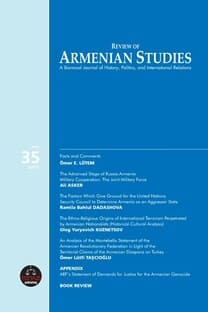TÜRKİYE’NİN GÜNEY KAFKASYA’DAKİ POLİTİAKLARI VE BÖLGESEL GÜVENLİK MEKANİZMALARI
TURKEY’S POLICIES IN THE SOUTHERN CAUCASUS AND REGIONAL SECURITY MECHANISMS
___
“Azerbaijan, Georgia and Turkey Have Agreed to Hold Joint Military Exercises”. Kavkaz-uzel.ru. 19.08.2014.http://www.kavkaz-uzel.ru/articles/247727/ “The Tbilisi Summit 2014 Gets under Way in Georgia”. Kavpolit.com. 06.05.2014.
http://kavpolit.com/articles/v_gruzii_startuet_tbilisskij_sammit_2014-4140/ Agadzhanyan, M. “Azerbaijan and Turkey Are Getting Close on the AntiArmenian Platform with the NATO Silent Agreement”. Kavkazoved.info.
09.02.2015. http://www.kavkazoved.info/news/2015/02/09/azerbajdzhan-iturcia-sblizhajutsja-na-antiarmjanskoj-voennoj-platforme-pri-molchalivom-so glasii-nato.html
Areshev, A. “A New Round of Armenian-Turkish ‘Game’ and Russia”. Fondsk.ru. 03.10.2011. http://www.fondsk.ru/news/2011/10/03/novyj-raundarmjano-tureckoj-igry-i-rossija.html
Avatkov, V.A. “Foreign Policy Line of the Republic of Turkey in Relation to Transcaucasian Countries within the Context of Turkey’s Foreign Policy Ideology”. Annual Publication of the Institute of International Studies. GIMO (U). No. 2 (8), 2014.
Çelikpala, M. “From a Failed State to a Weak One? Georgia and TurkishGeorgian Relations”. Turkish Yearbook of International Relations, vol. 36, 2005.
Ibragimov, R. “Turkish-Azerbaijani Relations and Turkey’s Policy in the Central Caucasus”. Caucasus and Globalization. Vol. 5, No. 3-4, 2011.
Kireyev, N (exec. ed.). “Turkey Between Europe and Asia. Results of Europeanization at the Turn of the 20th Century”. IVRANKraft, 2001.
Mardzhanyan, A. “We and RAND Corporation: Armenian-Turkish Relations”. XXI Century. Vol. 2, 2011.
Mavashev, Yu. “Will Turkey Be Factionalized?”. Kavkazgeoclub.ru. 25.08.2015. http://kavkazgeoclub.ru/content/raspadetsya-li-turciya Pylin, A.G. “Foreign Economic Relations of Azerbaijan within the Context of Regional Integration”. Problems of Post-Soviet Territories. No. 1 (3), 2015.
Semedov, S.A. “Basic Aspects of Turkey’s Contemporary Policy in the Caucasus”. Moscow University Newsletter. Series 18: Social and Political Sciences, No. 2, 2008.
Stephen Larrabee, F. “Troubled Partnership. U.S.-Turkish Relations in an Era of Global Geopolitical Change”. Rand Corporation.
http://www.rand.org/content/dam/rand/pubs/monographs/2009/RAND_MG89 9.pdf
Svarants, A. “Major Threats to the Interests of the Russian Federation from Ideology and Politics of Pan-Turkism (External and Internal Aspects)”. Region and the World. Yerevan, No. 1, 2010.
Urazova, Ye. “Turkey’s Interests and Stance in the Post-Soviet States in Central Asia and Southern Caucasus”. MGUPublishers. Globalistics as an Area of Science Research and Educational Discipline, Moscow, 2014.
- ISSN: 1303-5304
- Yayın Aralığı: 2
- Başlangıç: 2002
- Yayıncı: Terazi Yayıncılık Basım Dağıtım Danışmanlık Eğitim Organizasyon Matbaacılık Kırtasiye Tic. Ltd. Şti.
(TÜRKİYE’NİN GÜNEY KAFKASYA’DAKİ POLİTİAKLARI VE BÖLGESEL GÜVENLİK MEKANİZMALARI)
“1915’LE İLGİLİ TÜRK-ERMENİ ANLAŞMAZLIĞINI ANLAMAK”
(OSMANLI İMPARATORLUĞU’NUN BİR PARÇASI OLARAK KAFKASYA VE TRANSKAFKASYA)
(TARİHE KISA BİR BAKIŞ: KARS ANTLAŞMASI NASIL İMZALANDI (MART-EKİM 1921)?)
(“HAKKANİYETLİ TÜRKLER” ÜZERİNE BİR KİTAPÇIKLA İLGİLİ DEĞERLENDİRME)
(ERMENİLERİN KURDUKLARI CEMİYETLER VE KOMİTELERİN MARAŞ VE ÇEVRESİNDEKİ FAALİYETLERİ)
OSMANLI İMPARATORLUĞU’NUN BİR PARÇASI OLARAK KAFKASYA VE TRANSKAFKASYA
TÜRKİYE VE İRAN’IN GÜNEY KAFKASYA’DAKİ JEOPOLİTİK, TİCARİ VE EKONOMİK ÇIKARLARI
